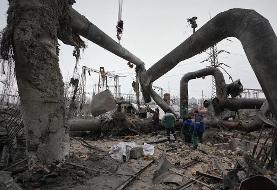Living with an Addict
Addiction is a family disease that stresses the family to the breaking point, impacts the stability of the home, the family's unity, mental health, physical health, finances, and overall family dynamics. Addiction can totally disrupt family life and cause harmful effects that can last a lifetime. This is why addiction is referred to as a family disease.

The disease of addiction affects the family on several levels. The addict is afflicted with a soul-killing and life-threatening illness that is guaranteed to rob him of his dignity, material possessions, and personal relationships before eventually ending in insanity, incarceration, or death. Meanwhile, members of the addict’s family – the wives, husbands, young children, grown children, brothers, sisters, parents, and so on – are profoundly affected. With the disease of addiction, the survival of both the addict and family members is at stake.
Effects of addiction on children
• Children raised in households where one or other parent is addicted to drugs suffer from emotional and behavioural problems that may last a lifetime. It is well-documented that such children are prone to problems like low self-esteem, feelings of loneliness, guilt, feelings of helplessness, fears of abandonment, and chronic depression. Young children of addicts exhibit a wide range of symptoms due to the stress of having an addict as a parent. Among these are frequent nightmares, bed-wetting, and uncontrolled crying.
• The children of addicts may also find it hard to form friendships, and they are often anxious about attending school. As these children grow older, they may exhibit such depressive symptoms as perfectionism, hoarding, isolating, or suffer from debilitating shyness and self-consciousness. Studies show that children of addicts feel that they are different from others, not as good as others – and in this way they closely resemble their addict parents. As teenagers, these children may develop phobias.
• Children of addicts often have problems in school. The stressful environment at home prevents them from studying, from focusing on tasks. They find it harder than their classmates to manage their time, to approach projects in a step-by-step fashion. Their school performance may also be affected by an inability to express themselves. They tend to have difficulty establishing relationships with teachers and classmates. The result is they often have to repeat the academic year and are more likely to drop out of school.
• Some children of addicts develop behavioural problems; they act out by lying, stealing, fighting, and truancy. The stress of live in unstable home environments manifests itself in self-defeating behaviours. Children thrive on orderly routine in the home, but these children never know what to expect from their addict parent. Because they are unable to predict what mood their parent is going to be in, these children are denied the steady loving care and guidance required for healthy development.
• It’s a paradox, though, that while some children of addicts act out in anti-social ways, others try to control their worlds by throwing themselves into their schoolwork, or by over-compensating in any of a number of ways. They yearn to prove their worth, to prove to themselves they are in control. They become over-achievers, but are denied the satisfaction that should accompany success. They may try people pleasing as a strategy to feel good about themselves. If others like them, they can turn their thoughts away from the fact they don’t much like themselves.
• At a deep, irrational level children of addicts feel responsible for their parent’s addiction. This leads them to believe they can stop their parents from using drugs if they behave in a certain way, such as performing better at school. This misapprehension is rooted in the child’s unconscious wish to exert control in a world that appears out of control. The child wants to believe he can fix his parent, and that by fixing the parent the child will finally get the loving attention and guidance he craves. Most children of addicts feel guilty for their failure to save their parents from the effects of drugs, and they spend their lives trying to assuage that guilt.
• Crime and violence are associated with addiction, with incest, abuse and battering common in such families. Sadly, incest and battering victims often blame themselves. Because they feel guilty, ashamed, and helpless, they themselves may turn to drugs to escape the pain. And so the cycle continues. Children of addicts are people who have been robbed of their childhood. Left untreated they will carry their problems into later life in some form or other.
• Adult children of addicts often fail to recognize that the root of their problems is their upbringing in a family with an addict parent. They suffer depression, aggression, or impulsive behaviour – and they have no idea from where these problems sprang.
• Studies show that the child of an addict is much more likely to abuse drugs himself. In fact, adult children of addicts are four times more likely than children of non-addicts to develop addiction. Genetic factors play a major role in the development of addiction. Another factor is an inability to deal with stress in a healthy way. Using drugs may be their way of addressing the very consequences, such as depression, that resulted from growing up with an addict parent.
• They are frequently failures as parents themselves, often make poor career choices, and almost always have a negative self-image. Adult children of addicts often have feelings of worthlessness and failure. They also may have problems with family responsibility, repeating the behaviour of their addict parent who was irresponsible and never provided for them.
• Many adult children of addict parents have problems with intimacy and find it hard to establish healthy relationships. Their previous experience has taught them not to trust others. They learned while growing up that if they love someone, that person will hurt them, just as their addict parent did. Research has shown that many of these same children of addicts choose addicts as mates.
Effects of addiction on spouses
• The husband or wife of an addict is under tremendous stress, which can lead to feelings of hatred, self-pity, and isolation. Living with a spouse who is an addict is exhausting, and can result in physical and mental problems. The responsibility for the home, including caring for any children, falls on the non-addict parent. All this tension may lead that parent to act unreasonably, to become demanding and irrational. Often the result is that the children are neglected.
• Financial difficulties are common. The family may have to give up certain privileges because money is being misspent on drugs instead of going to the household. The irresponsibility of the addict puts him at risk for joblessness, which is another worry added to those of his spouse.
• Addiction often ends in divorce. Not surprisingly, many family and marital problems can be traced to addiction in the home. Family members are rarely equipped to deal effectively with the addict in their midst and may make the situation worse by trying to help. Some families allow the addict to continue abusing drugs rather than confronting him, because they believe that is the best way of keeping the family together.
• It is difficult for those addicted to drugs and for family members to face up to the problem. Family members use denial to justify or rationalize the addict’s drug dependency. In the beginning, denial is understandable because every family loves and wants to protect its members, but there comes a time when denial does real damage to all concerned. When they deny the obvious and refuse to look for help, problems multiply.
Emotional effects of living with an addict
Addiction creates a complex network of unhealthy actions and reactions in the family unit. Each member is affected in his or her own way and will, in turn, affect others both in and outside the family. For example, the wife who has taken on added family and financial responsibilities feels guilty about having to ignore the needs of her children, who are themselves showing signs of lack of parental attention. Or the mother whose son abuses drugs is constantly anxious and who isolates for fear others may find out.
Families living with addiction experience a range of destructive emotions, which affect their mental health, their behaviour, and their quality of life. Among these are:

1. Guilt
Very typically, family members feel responsible for the drug problem in their midst. They believe they did something that led to the loved one’s addiction. This is particularly true of parents whose children abuse drugs. But children of addicts also fall prey to this false belief. Note, though, that addicts are very adept at picking up on these feelings and will use them to manipulate family members. The addict may also use a parent’s guilt as justification to continue abusing drugs. These irrational guilty feelings usually lead family members to act in ways that do harm to themselves and to the addict. One main response to guilt is enabling behaviour, which clears the way for the addict to continue down the path of addiction. The mother who believes that her grown child’s addiction is the result of her failure as a parent will go to great lengths to cover up for that child. She will lie for that child, will pay for lawyers, will give that child money when the child should be supporting himself. What she is doing, though her guilt prevents her from seeing it, is preventing her child from experiencing the consequences of his addiction.
2. Anger
Exasperation and frustration are constants in households where addiction exists. When faced with the never-ending challenges of addiction, one typical reaction is anger. You are angry because a loved one is struck with addiction. Frustrated that no matter how hard you try, you cannot make them see the truth of their condition, and so you are angry. Overwhelmed with the damage their behaviour is causing the family, you are angry. Despite your many attempts, you have been unable to pull them out of their addiction, and so you are angry. Exhausted by your efforts to clean up the mess the addict creates, you are angry.
3. Denial & shame
With addiction comes shame and denial. There is a lot of stigma attached to addiction. Many view it as a moral failing, a sign of weakness. Though the medical establishment recognizes addiction as a disease that can affect anyone, families afflicted by addiction usually experience painful feelings of shame. Not knowing where to turn, family members may go into a state of denial. Because it is too painful and humiliating to face the reality that a loved one is an addict, family members turn their faces from the evidence. In effect, they are trying to keep the fact of the addiction a secret from themselves and others.
4. Stress
Living with an addict is very stressful. While the addict sails along oblivious to his behaviour and actions, family members are forced to confront the consequences of his addiction. The family is always on edge, never knowing how the addict will behave one minute to another. They feel lost, confused and stressed, as the addict goes on his manipulative, lying way. When the addict resorts to crime to buy his drugs, when he has an accident because he was high and out of it, when he becomes violent and gets into a fight, family members may feel forced to go to the rescue to save him and save the good name of the family.
Family rules
Each member of the family unit learns to behave and think in ways expected of them, according to established family rules. These rules are learned over time and are largely unspoken, but they play a vital role in providing a sense of stability and safety. Understanding how family rules evolve in response to circumstances is vital to understanding how addiction impacts the family and how family members may respond in unhealthy and unproductive ways.
Addiction often occurs gradually, beginning as isolated episodes that over time become more frequent and serious. Very often the person starting to abuse drugs does not realize they are headed for addiction. Family members too are often unaware of what is happening to their loved one. Part of the problem is that they may tend to minimize or deny the mounting evidence that the person is getting into serious trouble with drugs. As the drug abusing family member falls deeper into addiction, they devote more time and energy to acquiring and using drugs – and to recuperating from them. In a very real sense, another relationship – that between the addicted member and his drugs -- has become part of the family unit. The other family members may be vaguely aware that things have changed but are often unable to identify exactly what is happening. They only know that home is no longer a safe place; that tension and stress have replaced safety and predictability; and that the person they once knew has changed and is now chronically irritable, short-tempered, or too tired or disinterested to interact in a healthy way with the rest of the family.
Emergence of unhealthy rules
In response to having an addicted family member whose behaviour has become erratic and unreasonable, family members develop coping strategies that over time become an integral part of the emotional and behavioural fabric of the family. The non-addict spouse, parents, or children are often forced to ignore their own needs, as well as the needs of other members, as they seek, for example, to avoid confrontations with the addicted family member, to excuse or cover up their problematic behaviours, or to deal with the financial consequences of it. Family rules that formerly provided safety and predictability are no longer working, and new rules gradually emerge. Family members consciously and unconsciously develop behaviours and coping mechanisms to adapt to and soften the impact of the addiction on the addict and themselves. These rules, which grow out of desperation to keep the family unit together, are usually unhealthy. Yet even though these new rules are adversely affecting the wellbeing of family members, they eventually become a central organizing feature of the family system.
Recovery despite living with an addict
• Just as there are 12 Step recovery programs for drug addicts like Narcotics Anonymous, there are 12 Step programs for family members, with Nar-anon and Families Anonymous two of the most successful. There are also 12 Step Fellowships specifically for children of addicts. These Fellowships sprang up in recognition that the thinking and emotional lives of family members suffer damage right along that of the addict. All these family support groups’ philosophy is based upon Alcoholic Anonymous’ Twelve Step Recovery Program. The main goal of these Fellowships is to help family members understand that they are not responsible for an addict’s drug problems and that family members’ recovery does not depend upon the addict’s recovery.
• Addiction affects each member of the family – from the unborn child to the addict’s spouse. Its far-reaching effects result in physical problems for the addicts, but also in physical and psychological problems for members of the family. Recovery from the devastating effects of addiction is a process for the addict but also for the family. Fortunately, there are many who have been able to heal and restore their lives through the support and program of recovery of 12 Step Family groups.
This article has been derived from Hamrah’s website. Hamrah is a resource and educational website primarily aimed towards Iranian and Farsi speaking addicts living abroad that provides information on the disease of addiction, its various manifestations and its effects on family members. For further information on addiction and recovery, please refer to: www.hamrah.co
»This is a summary of the original feature in Farsi. To request a more extensive translation of the Farsi text, please contact us.



























































